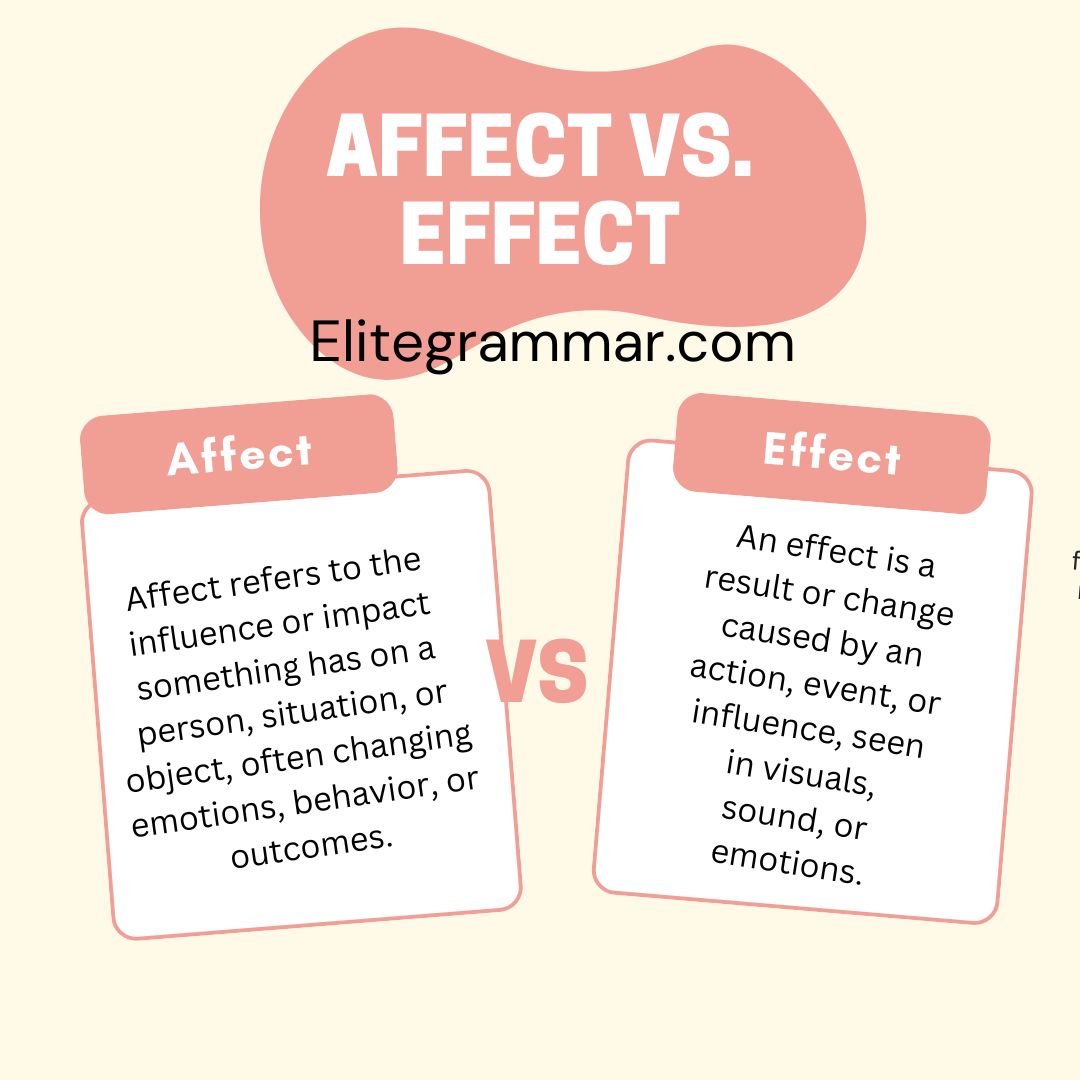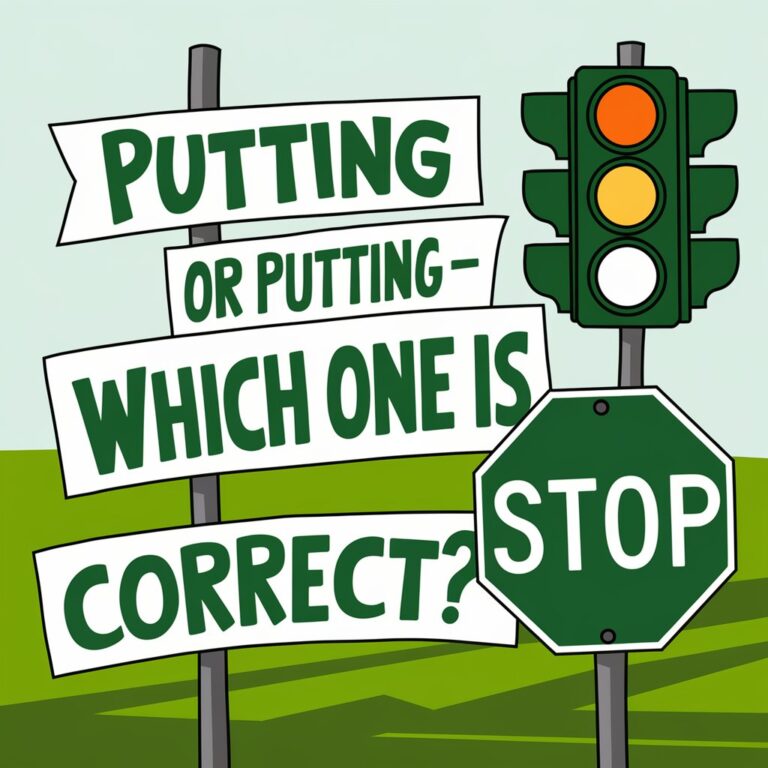Affect vs Effect: A Comprehensive Guide to Understanding the Difference
Language is a significant tool, and the English language itself is usually quite complicated and delicate. Many English speakers, and even the native ones, confuse the words “affect” and “effect.” These two terms, although they are used alternately in casual conversation, they don’t mean the same thing, and misuse can have a negative effect on you.
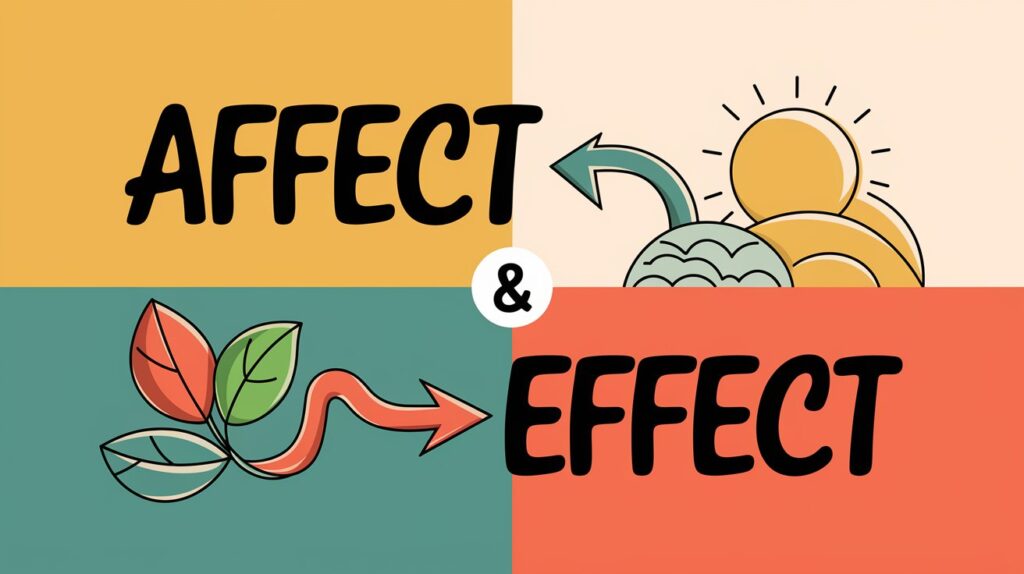
This long blog post will give you all the information necessary to understand the intricacies between “Affect vs Effect”. When you read this manual, you will know exactly how to use “affect” and “effect” so that your speech and writing will be both correct and to the point. “affect” and “Effect”
Understanding the Basics: What Are Affect and Effect?
Before diving into the nitty-gritty details, let’s break down the two words at their most basic level.
- Affect (verb): To influence something or someone. It refers to the action of making a change in something or someone.
- Effect (noun): A result or outcome of something. It refers to the change that occurs due to a particular cause.
In short:
- Affect is an action.
- Effect is an outcome.
The Role of Affect and Effect in Sentences
Let’s take a closer look at how “affect” and “effect” function within sentences:
Affect (verb):
When used as a verb, “affect” refers to influencing something. It suggests that one thing has an impact on another. For example:
- The new law will affect the economy.
- His mood was affected by the news.
- The weather can affect your health.
Effect (noun):
When used as a noun, “effect” refers to the result or consequence of a particular action. It is the outcome of something that has been affected. For example:
- The new law had a positive effect on the economy.
- The effect of the medicine was immediate.
- The weather had a severe effect on the crops.
When to Use Affect vs. Effect: A Detailed Breakdown
While the fundamental definitions may be quite simple, there are some fine points of usage that complicate matters. Let’s examine them in more detail:
1. Affect as a Verb
As was said before, “affect” is usually used as a verb, and it is an action. In most situations, it is describing how something impacts or alters another thing. In science, psychology, and formal writing, “affect” is widely used.
Examples of “affect” as a verb:
- The new policy will likely affect job opportunities.
- The film deeply affected the audience.
- The hurricane affected thousands of people.
2. Effect as a Noun
“Effect,” however, is most commonly a noun. It refers to the outcome or consequence of an action, event, or situation. The effect is what results as a consequence of having occurred.
Examples of “effect” as a noun:
- The effect of the new policy is still unclear.
- The effects of global warming are becoming more evident.
- The medicine had an immediate effect on her symptoms.
Common Mistakes: Affect vs. Effect
One of the most common mistakes in English is mixing up “affect” and “effect.” Some common mistakes people do include:
1. Using “Affect” When “Effect” is Needed
One of the most frequent errors is to use “affect” where a noun is called for, and use “effect” instead.
Incorrect: The effect of the new law will affect the economy. Correct: The effect of the new law will affect the economy.
Here, “effect” is used to denote the outcome of the new law, and “affect” is the verb form to denote how the law is going to modify the economy.
2. Using “Effect” When “Affect” is Needed
Another error is to use “effect” when a verb is needed. This is less frequent but does occur, particularly in spoken language or casual writing.
Wrong: The manner in which he spoke had a positive impact on all. Right: The manner in which he spoke had a positive effect on all.
Remember that “affect” should be used to describe an influence, while “effect” is the result of that influence.
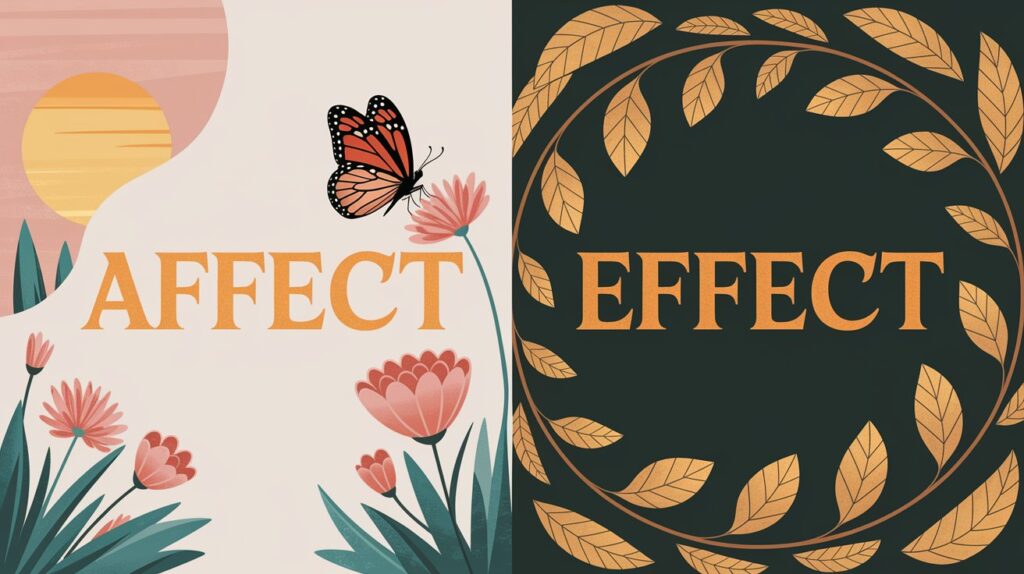
Special Cases and Exceptions: When the Rules Don’t Apply
There are some exceptions and special cases in which the standard rules don’t apply. Let’s take a look at these more complex instances:
1. Affect in Psychology (Noun)
In psychology, “affect” can be used as a noun to refer to a person’s emotional state or mood. In this context, “affect” is not a verb but a noun.
Example:
- The patient displayed a flat affect, indicating possible depression.
Here, “affect” refers to the person’s emotional state or facial expression, not an action.
2. Effect in Phrasal Verbs
Sometimes, “effect” appears in phrasal verbs, where it retains its role as a noun. One such phrasal verb is “take effect,” which means to start having an impact.
Example:
- The new rule will take effect next month.
In this case, “effect” still functions as a noun, but the phrase “take effect” means that the rule will begin to have consequences.
Remembering the Difference: Simple Tips
To avoid confusion in your writing, here are some simple tips and tricks to help you remember when to use “affect” and “effect.”
1. The Acronym Trick
One of the easiest ways to remember the difference is by using the acronym RAVEN:
- R = Result = Effect (Noun)
- A = Action = Affect (Verb)
- V = Verb = Affect (Verb)
- E = End = Effect (Noun)
- N = Noun = Effect (Noun)
2. Affect as a Verb (Action)
If you’re not sure whether to use “affect” or “effect,” ask yourself: Is it describing an action (the verb)? If yes, then use “affect.”
- Does the action influence or change something? Use affect.
3. Effect as a Noun (Result)
Ask yourself: Does it describe the outcome or result of something? If yes, then use “effect.”
- Is it the result of an action or event? Use effect.
Real-World Examples: Affect and Effect in Different Contexts
Let’s examine some examples from various fields to highlight how “affect” and “effect” are used in real-world scenarios.
1. In Medicine
In medical contexts, “affect” and “effect” are frequently used to discuss how one factor influences a person’s health and the resulting consequences of that influence.
- Affect: The drug may affect your liver function.
- Effect: The effect of the drug on your liver will be monitored by the doctor.
2. In Environmental Science
Environmental scientists often discuss the “affect” of human activities on the environment and the subsequent “effects” of those changes.
- Affect: Climate change can affect the health of ecosystems.
- Effect: The effect of deforestation on biodiversity is devastating.
3. In Everyday Speech
In everyday conversation, people often discuss personal situations and experiences using “affect” and “effect.”
- Affect: The news about the accident deeply affected her.
- Effect: The effect of the unexpected event was overwhelming.
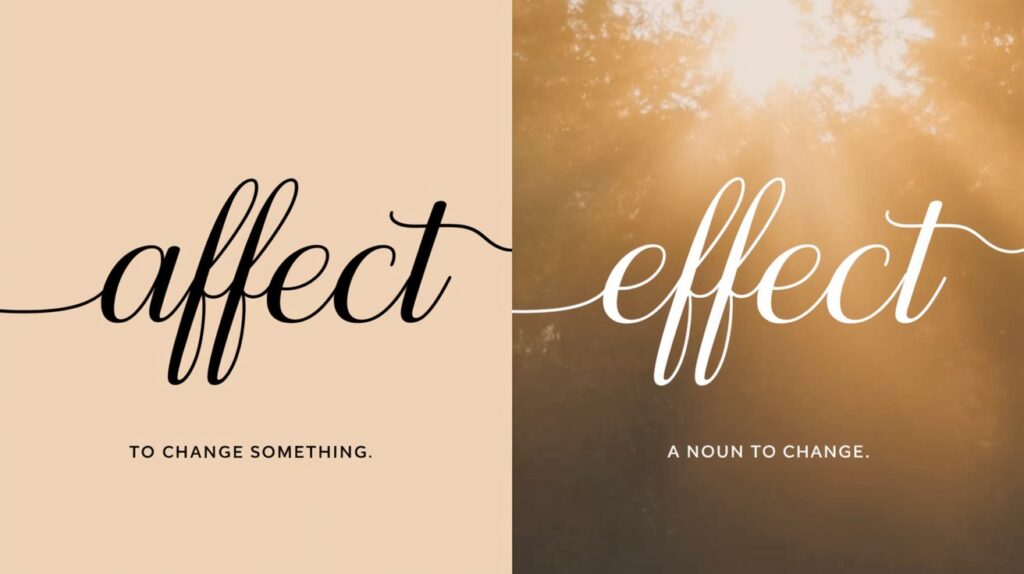
affect vs effect examples
Affect (Verb – To influence or change something)
- The new regulations will affect the company’s profit margins.
- The verb “affect” means the new regulations will influence or change the company’s profit margins.
- Her speech deeply affected the audience.
- “Affect” is used here to describe how the speech influenced the emotions or thoughts of the audience.
- The weather can affect your mood and energy levels.
- “Affect” means the weather influences how you feel or how much energy you have.
- Lack of sleep can negatively affect your health.
- “Affect” shows how the lack of sleep will have an impact on your health.
- The announcement of the new product will likely affect sales.
- “Affect” refers to how the announcement will influence or change sales.
Effect (Noun – The result or outcome of something)
- The new regulations had a significant effect on the company’s profit margins.
- “Effect” here is used as a noun, referring to the result or outcome of the new regulations on the company’s profit margins.
- The positive effect of her speech was clear in the audience’s response.
- “Effect” refers to the outcome of her speech, i.e., the response from the audience.
- Exercise has a positive effect on your mental health.
- “Effect” here is the noun, meaning the result of exercising on mental health.
- The effect of the medication was immediate, relieving her pain within minutes.
- “Effect” is used to describe the result of taking the medication.
- The law had a profound effect on reducing pollution in the city.
- “Effect” is used here to describe the result or outcome of the law on pollution levels.
Additional Examples:
- Affect:
- The news of the disaster greatly affected him. (It influenced his emotional state.)
- Effect:
- The effect of the disaster was felt worldwide. (The result or outcome of the disaster was felt worldwide.)
- Affect:
- The new tax law will affect middle-class families more than the wealthy. (It will influence middle-class families more.)
- Effect:
- The effect of the new tax law on middle-class families will be significant. (The result of the tax law will be significant.)
Summary:
Affect (verb) means to influence or change something.
Effect (noun) refers to the result or outcome of something.
affect vs effect quiz
Choose whether Affect or Effect fits best in each sentence:
- The new policy will _______ the local economy in unexpected ways.
a) Affect
b) Effect - The ______ of the new educational program was immediately noticeable in test scores.
a) Affect
b) Effect - The weather can _______ your mood, making you feel either energized or sluggish.
a) Affect
b) Effect - The _______ of the storm was devastating, leaving thousands without power.
a) Affect
b) Effect - His decision to quit his job had a negative _______ on his mental health.
a) Affect
b) Effect - The new technology has the potential to _______ the way we work and live.
a) Affect
b) Effect - The changes in the law will take _______ next month.
a) Affect
b) Effect - The psychologist noted that her patient’s flat _______ indicated signs of depression.
a) Affect
b) Effect - Pollution has a profound _______ on the environment.
a) Affect
b) Effect - The teacher’s encouragement had a positive _______ on her students’ performance.
a) Affect
b) Effect
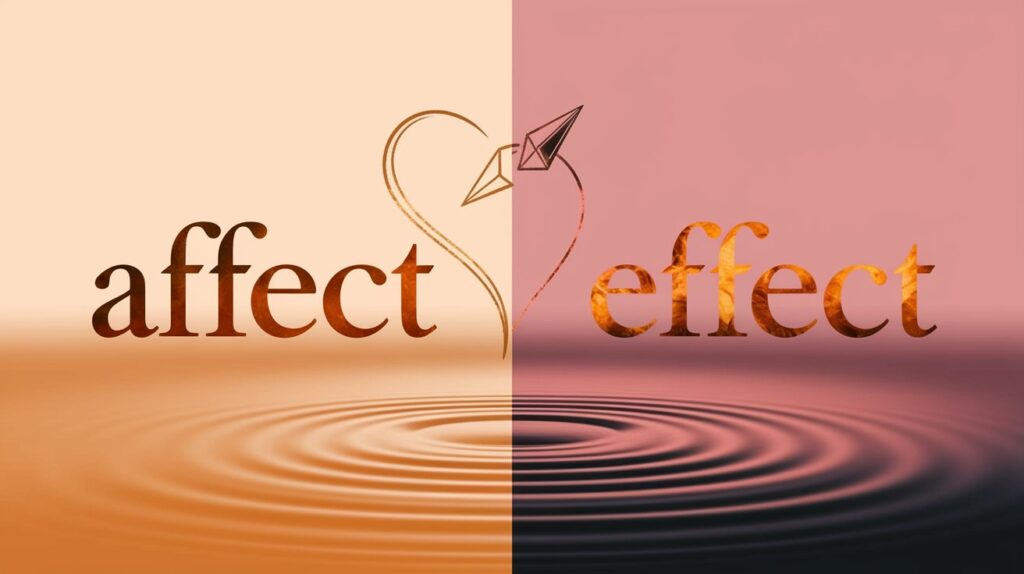
Answer Key:
- a) Affect — “Affect” is used as a verb here, meaning to influence.
- b) Effect — “Effect” is used as a noun, referring to the result of the program.
- a) Affect — “Affect” is the verb here, meaning to influence someone’s mood.
- b) Effect — “Effect” is the noun, referring to the outcome of the storm.
- b) Effect — “Effect” is the noun here, referring to the result of the decision.
- a) Affect — “Affect” is used as a verb, meaning to influence how we work and live.
- b) Effect — “Effect” is used here as a noun, indicating the result of the changes in law.
- a) Affect — “Affect” is the noun here, referring to the patient’s emotional state.
- b) Effect — “Effect” is used as a noun, referring to the result of pollution.
- b) Effect — “Effect” is used as a noun, referring to the positive result of the teacher’s encourage.
Final Thoughts: Mastering Affect and Effect
Affect vs. Effect: The difference between the two words is important for clear and precise communication. They are so often confused that it’s important to keep in mind their main functions “affect” as a verb and “effect” as a noun when you use them in your writing and speaking.
It becomes easier to be capable of using both these words in English language through practice. Whether you’re writing essays, crafting reports or simply talking with others, being aware of the difference between affect and effect will.
If you want to explore whole site : Click Here
FAQS : Affect vs Effect: A Comprehensive Guide to Understanding the Difference
What are some common mistakes people make when using “affect vs effect?
Common mistakes with affect vs. effect:
Using effect as a verb instead of affect → ❌ The weather will effect my mood. ✅ The weather will affect my mood.
Using affect as a noun instead of effect → ❌ The new policy had a positive affect. ✅ The new policy had a positive effect.
Forgetting effect can be a verb (meaning “to cause”) → ✅ The new law effected change.
Not knowing affect is a noun in psychology (emotional response) → ✅ He showed no affect.
Quick Trick:
Affect = Verb (influence)
Effect = Noun (result)
affect vs effect examples?
Here are some examples of affect vs. effect in sentences:
Affect (verb – to influence):
The weather can affect my mood.
His words affected her deeply.
Lack of sleep affects concentration.
Effect (noun – result or outcome):
The new policy had a positive effect on productivity.
The medicine had some side effects.
Her speech made a lasting effect on the audience.
affect vs effect trick?
Here’s an easy trick to remember affect vs. effect:
🔹 Affect = Action (verb) → It means to influence something.
Example: The weather affects my mood.
🔹 Effect = End result (noun) → It means the result or outcome of something.
Example: The new policy had a positive effect.
Mnemonic: “A” for Affect = Action (verb), “E” for Effect = End result (noun).
affect vs effect in a sentence?
Affect (verb): The rainy weather affects my mood.
Effect (noun): The effect of the new law was immediate.
affect vs effect meaning?
Affect (verb): Means to influence or produce a change in something. (Example: The new policy will affect how we work.)
Effect (noun): Refers to the result or outcome of a cause. (Example: The new policy had a positive effect on productivity.)
A trick to remember: Affect is an Action (A = verb), Effect is an End result (E = noun).
affect vs effect definition?
Affect (verb): To influence or produce a change in something. (Example: The cold weather can affect your health.)
Effect (noun): The result or outcome of a cause. (Example: The new law had a significant effect on businesses.)
affect vs effect quiz?
The new manager’s policies will ______ employee productivity.
The medicine had a positive ______ on her recovery.
His speech didn’t ______ my opinion at all.
The special effects in that movie had a stunning visual ______.
Stress can negatively ______ your health over time.

